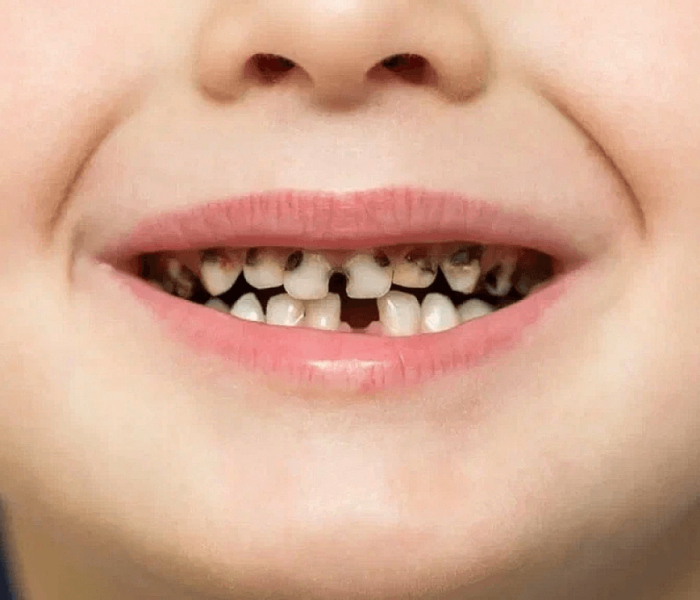Have you ever wondered what causes black spots on teeth? Black teeth comprises of various external factors, such as enamel damage, coffee stains, and internal factors, such as decay or pulpitis can cause these dark areas. Symptoms often begin with tooth sensitivity and the appearance of small black dots near the gums. Regular dental exams, daily flossing, and brushing with fluoride toothpaste are all part of preventative care, as is abstaining from tobacco and caffeine.
What Are Black Teeth?
Black teeth, also known as black tooth stain or black spot, refers to a dental condition where dark black spots occur on the teeth. This can be a cosmetic dentistry related problem and can indicate more dental problems.
- Enamel: The tooth's hard outer covering is called the enamel.
- Dentin: Dentin is the layer below the tooth enamel. It contains microscopic tubes that allow heat, cold, and acid to stimulate nerve endings. Damage to the enamel can expose the dentin.
- Pulp: This is the center of the tooth. The dental pulp contains blood vessels, connective tissue, and nerves. Teeth appear black due to enamel discoloration. Teeth can turn black due to external and internal reasons.
External Causes
- Enamel damage
- Stains
- Tartar build-up
- Eating or drinking frequent dark foods such as coffee
- Taking certain medications such as liquid iron preparations
- The use of certain mouthwashes and toothpastes
- The use of tobacco use of crowns and silver sulfide fillings
Internal Causes
Symptoms
Stain Prevention
- Brushing teeth twice a day with flour paste
- Interdental cleaners daily
- Regular dental checkups
- Coffee
- Cola
- Black tea
- Red wine
- Tobacco products
Treatment Of Black Teeth
- Treating black spots on the teeth is quite easy, often they can be caused by a small cavity or chip in the tooth, which either takes stains or is slightly rotten.
- A dentist can usually remove a small amount of tooth around this area by removing the stain and/or decay and placing a tooth-colored bonding material in the area.
- Dental bonding naturally blends in with the surrounding teeth, so the repair is not visible.
- Black lines on teeth can be treated with dental bandages as well. If the black line on the tooth is at the gum line and you have a piece of tooth, such as a veneer or crown.
- Whitening of dead teeth is also possible. This is bleaching with a peroxide gel that can significantly whiten teeth.
What Is The Outlook For Black Teeth?
Examples of these habits are:
- Brushing at least twice a day and using fluoride toothpaste
- Flossing or brushing at least once a day
- Regular dental visits as recommended by the dentist (this can take four to six months, some people with severe decay may need to plan more time)
- Eating a healthy diet of fruits, vegetables and whole grains (sugary drinks and foods should be avoided because sugar attracts putrefactive bacteria)
- Avoiding chronic dry mouth, which may be due to the use of certain medications or an underlying condition that causes dry mouth (saliva and moisture wash away harmful bacteria
- Dry mouth is more likely to decay. With excellent dental care, a person can ideally prevent black teeth from recurring.
Conclusion
Frequently Asked Questions
A common misconception is that the tooth darkens after root canal treatment. Teeth often darken before root canal treatment as the tooth rots and decays from the inside. However, a slight darkening of the tooth may occur after the root canal treatment, depending on how the root canal treatment is performed and with which material.
The discoloration may accumulate over years if tooth decay is the root cause. If the stain is caused by trauma, the tissue inside the tooth begins to die and turn black as soon as the blood supply to the tooth is cut off.
If a dead tooth is left untreated, it will turn black as the inner tissue of the tooth dies and decays. If a dead tooth has been root-treated with a tooth-coloring treatment, the tooth may not darken completely, but it may darken slightly.

















